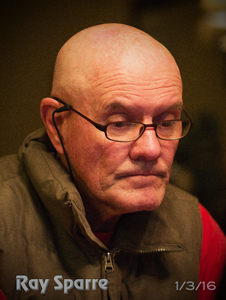
Insightful Musings on theScriptures
by
Raymond P. Sparre
Northwest University class of '67
Greetings, dear ones.
Becki and I just came in from our little 5-circuit walk/jog on our own place. I’m again parked here next to the wood stove at the dining table. Heated up from the jog makes this a rather uncomfortable hot spot. But no biggie—I’ve been in hot spots before.
Oh, good!—I see that Becki is in the process of starting another batch of bread. We’ve been out of her good bread for a few days. Very seldom do we buy bread. And when we do, we try to avoid that stuff that takes 15 minutes to read the ingredients label. Don’t you wish you could be here about the time it comes out of the oven? If you were to show up about 11am, you could try on a slice. Why would anyone pass up an opportunity like that? Not me!
Blessings on your day—as you remember that man shall not live on Becki’s bread alone!
Love, Dad/Ray.
Psalm 35 is one of David’s imprecatory compositions—a prayer to God against those who seek to do him harm. Slander, backbiting, scheming to turn public sentiment against him, and plotting to end his life—David has seen it all take form against him. He is obviously in a hot spot of this kind at the point of this writing. It serves to address a difficult balance. On one hand we are instructed in Scripture to love our enemies, and pray for those who abuse us. But it also has to be right to pray for God’s intervention against crime, injustice, and the exploitation of the weak, poor, and innocent—“Thy kingdom come, Thy will be done in earth as it is in heaven.” Once again, the most outstanding role modeling lesson David provides here is not so much in what he says. He may not even be absolutely flawless in his understanding and processing of the big picture. The greatest value of his example is in where he goes to pour out his honest feelings of stress and hurt. He runs to his Sovereign LORD—Who is not at all offended by the honest cries of His children. That right there represents huge lesson value. And it’s probably where we humans fail the most. “Oh, what peace we often forfeit, Oh, what needless pain we bear, All because we do not carry Everything to God in prayer.”
The FOCUS VERSE is drawn from the very last lines of this psalm. That too is noteworthy. After describing all his pain and anger over being the victim of so much injustice, David’s conclusion is that, no matter what, his LORD is worthy of his trust, praise, and worship. It’s like he takes a solid heart-level stand saying, “I refuse to allow my circumstances to rob me of my love for and dependence upon my Savior and LORD! No matter how ugly things get, He is still worthy of my worship!”
In so doing, David is also modeling the practical application of a highlight principle contained in Proverbs 4:23—“Above all else, guard your heart, for it is the wellspring of life.” That boils down to the most challenging job description facing us all!
love her, and she will watch over you.”